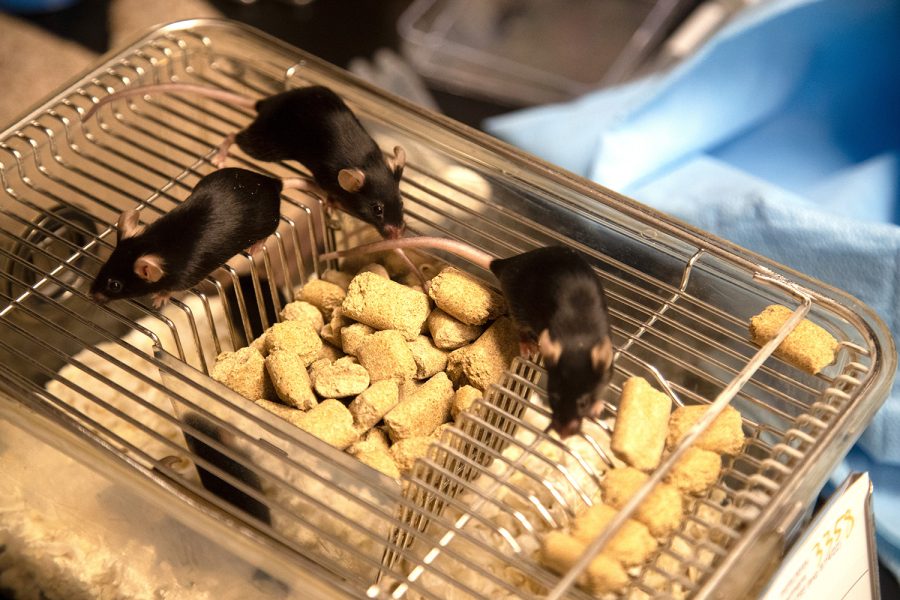UI researchers identify drug to cure mice of COVID-19 symptoms, may treat older adults
Researchers at the University of Iowa tested a drug on older mice with COVID-19, saving them from death and severe symptoms. The drug may similarly affect infected older adults.
A lab mouse is seen in a lab in the Bowen Science Building at the University of Iowa on Monday. April 11, 2022.
April 11, 2022
Researchers at the University of Iowa found a drug to prevent older mice, who suffer from COVID-19 in a similar way to older people, from dying of the virus.
The older mice that had COVID-19, which were dying at higher rates than others, were by and large preserved and free of severe symptoms when injected with the drug asapiprant.
The findings were made by the McCray and Perlman labs at the UI with the help of an international partner in Spain and published in the journal Nature on March 21.
Lok-Yin Roy Wong, the first author of the paper and a postdoctoral research fellow at the UI’s Department of Microbiology and Immunology, said the drug blocks a specific pathway within the immune system and consequently reverses the effects of aging.
“We also found that there’s significantly less virus in the lungs of the drug-treated mice,” he said. “So basically the drug protects older mice from lethal infection.”
Paul McCray, co-author of the paper and professor of pediatrics-pulmonary medicine at the UI, said the signaling pathway in the immune system that the drug targets is more active in older mice, which leads to impaired function.
“There’s a lot of evidence that as people age various aspects of their immunity become impaired,” McCray said. “That makes them more susceptible to bad outcomes with a variety of infectious diseases.”
Compared to the older mice that were not given asapiprant, the drug-treated mice survive much better after lethal injections of COVID-19, Wong said.
Mice that were not treated with the drug lost a significant amount of weight, he said, eventually succumbing to the disease, whereas those treated with the drug lost little weight.
Wong said different variants of the virus do not seem to affect the positive benefits of the drug, since it targets the immune system of the host rather than the virus itself.
“So, it’s actually independent of the variant,” he said.
McCray said the drug was originally used by another company to treat asthma.
“It turns out based on the studies, it might be helpful in improving immune function for the elderly, affected by COVID-19,” he said. “A key take-home message is that a drug was identified that could be helpful for a therapy.”
Although the mouse models are key to any drug testing, McCray said the experiment alone cannot predict the outcome of the drug’s effects on humans. Researchers are currently testing the drug’s effects on patients with COVID-19.
“I think there’s several reasons to think that it’s possible it’ll be helpful,” he said.
Wong said the drug, if used to treat human patients, would be used as an antiviral treatment rather than a prophylactic or vaccine, meaning it would be used once a patient has already been infected.
“Hopefully, if the drug mimics what we saw in our animal model, then there is a chance that it might work in humans, but we still have to wait for the data from the clinical trials to be sure,” Wong said.



